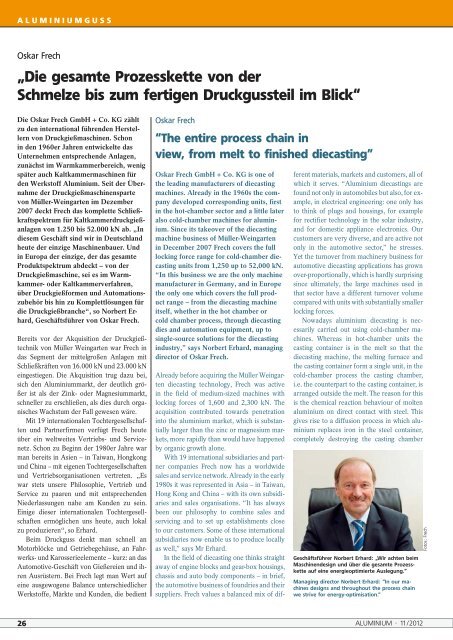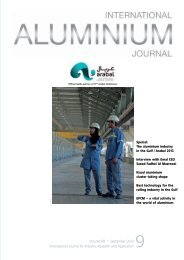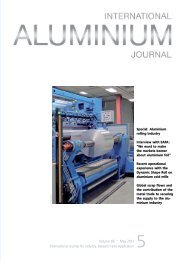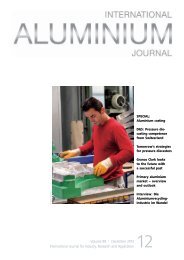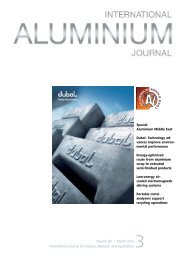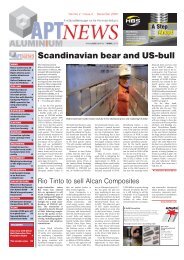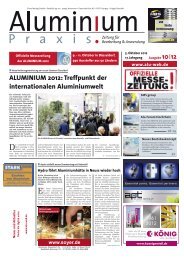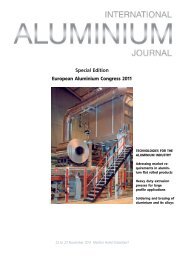special - ALUMINIUM-Nachrichten – ALU-WEB.DE
special - ALUMINIUM-Nachrichten – ALU-WEB.DE
special - ALUMINIUM-Nachrichten – ALU-WEB.DE
Create successful ePaper yourself
Turn your PDF publications into a flip-book with our unique Google optimized e-Paper software.
<strong><strong>ALU</strong>MINIUM</strong>GUSS<br />
Oskar Frech<br />
„Die gesamte Prozesskette von der<br />
Schmelze bis zum fertigen Druckgussteil im Blick“<br />
Die Oskar Frech GmbH + Co. KG zählt<br />
zu den international führenden Herstellern<br />
von Druckgießmaschinen. Schon<br />
in den 1960er Jahren entwickelte das<br />
Unternehmen entsprechende Anlagen,<br />
zunächst im Warmkammerbereich, wenig<br />
später auch Kaltkammermaschinen für<br />
den Werkstoff Aluminium. Seit der Übernahme<br />
der Druckgießmaschinensparte<br />
von Müller-Weingarten im Dezember<br />
2007 deckt Frech das komplette Schließkraftspektrum<br />
für Kaltkammerdruckgießanlagen<br />
von 1.250 bis 52.000 kN ab. „In<br />
diesem Geschäft sind wir in Deutschland<br />
heute der einzige Maschinenbauer. Und<br />
in Europa der einzige, der das gesamte<br />
Produktspektrum abdeckt <strong>–</strong> von der<br />
Druckgießmaschine, sei es im Warmkammer-<br />
oder Kaltkammerverfahren,<br />
über Druckgießformen und Automationszubehör<br />
bis hin zu Komplettlösungen für<br />
die Druckgießbranche“, so Norbert Erhard,<br />
Geschäftsführer von Oskar Frech.<br />
Bereits vor der Akquisition der Druckgießtechnik<br />
von Müller Weingarten war Frech in<br />
das Segment der mittelgroßen Anlagen mit<br />
Schließkräften von 16.000 kN und 23.000 kN<br />
eingestiegen. Die Akquisition trug dazu bei,<br />
sich den Aluminiummarkt, der deutlich größer<br />
ist als der Zink- oder Magnesiummarkt,<br />
schneller zu erschließen, als dies durch organisches<br />
Wachstum der Fall gewesen wäre.<br />
Mit 19 internationalen Tochtergesellschaften<br />
und Partnerfirmen verfügt Frech heute<br />
über ein weltweites Vertriebs- und Servicenetz.<br />
Schon zu Beginn der 1980er Jahre war<br />
man bereits in Asien <strong>–</strong> in Taiwan, Hongkong<br />
und China <strong>–</strong> mit eigenen Tochtergesellschaften<br />
und Vertriebsorganisationen vertreten. „Es<br />
war stets unsere Philosophie, Vertrieb und<br />
Service zu paaren und mit entsprechenden<br />
Niederlassungen nahe am Kunden zu sein.<br />
Einige dieser internationalen Tochtergesellschaften<br />
ermöglichen uns heute, auch lokal<br />
zu produzieren“, so Erhard.<br />
Beim Druckguss denkt man schnell an<br />
Motorblöcke und Getriebegehäuse, an Fahrwerks-<br />
und Karosserieelemente <strong>–</strong> kurz: an das<br />
Automotive-Geschäft von Gießereien und ihren<br />
Ausrüstern. Bei Frech legt man Wert auf<br />
eine ausgewogene Balance unterschiedlicher<br />
Werkstoffe, Märkte und Kunden, die bedient<br />
Oskar Frech<br />
“The entire process chain in<br />
view, from melt to finished diecasting”<br />
Oskar Frech GmbH + Co. KG is one of<br />
the leading manufacturers of diecasting<br />
machines. Already in the 1960s the company<br />
developed corresponding units, first<br />
in the hot-chamber sector and a little later<br />
also cold-chamber machines for aluminium.<br />
Since its takeover of the diecasting<br />
machine business of Müller-Weingarten<br />
in December 2007 Frech covers the full<br />
locking force range for cold-chamber diecasting<br />
units from 1,250 up to 52,000 kN.<br />
“In this business we are the only machine<br />
manufacturer in Germany, and in Europe<br />
the only one which covers the full product<br />
range <strong>–</strong> from the diecasting machine<br />
itself, whether in the hot chamber or<br />
cold chamber process, through diecasting<br />
dies and automation equipment, up to<br />
single-source solutions for the diecasting<br />
industry,” says Norbert Erhard, managing<br />
director of Oskar Frech.<br />
Already before acquiring the Müller Weingarten<br />
diecasting technology, Frech was active<br />
in the field of medium-sized machines with<br />
locking forces of 1,600 and 2,300 kN. The<br />
acquisition contributed towards penetration<br />
into the aluminium market, which is substantially<br />
larger than the zinc or magnesium markets,<br />
more rapidly than would have happened<br />
by organic growth alone.<br />
With 19 international subsidiaries and partner<br />
companies Frech now has a worldwide<br />
sales and service network. Already in the early<br />
1980s it was represented in Asia <strong>–</strong> in Taiwan,<br />
Hong Kong and China <strong>–</strong> with its own subsidiaries<br />
and sales organisations. “It has always<br />
been our philosophy to combine sales and<br />
servicing and to set up establishments close<br />
to our customers. Some of these international<br />
subsidiaries now enable us to produce locally<br />
as well,” says Mr Erhard.<br />
In the field of diecasting one thinks straight<br />
away of engine blocks and gear-box housings,<br />
chassis and auto body components <strong>–</strong> in brief,<br />
the automotive business of foundries and their<br />
suppliers. Frech values a balanced mix of different<br />
materials, markets and customers, all of<br />
which it serves. “Aluminium diecastings are<br />
found not only in automobiles but also, for example,<br />
in electrical engineering: one only has<br />
to think of plugs and housings, for example<br />
for rectifier technology in the solar industry,<br />
and for domestic appliance electronics. Our<br />
customers are very diverse, and are active not<br />
only in the automotive sector,” he stresses.<br />
Yet the turnover from machinery business for<br />
automotive diecasting applications has grown<br />
over-proportionally, which is hardly surprising<br />
since ultimately, the large machines used in<br />
that sector have a different turnover volume<br />
compared with units with substantially smaller<br />
locking forces.<br />
Nowadays aluminium diecasting is necessarily<br />
carried out using cold-chamber machines.<br />
Whereas in hot-chamber units the<br />
casting container is in the melt so that the<br />
diecasting machine, the melting furnace and<br />
the casting container form a single unit, in the<br />
cold-chamber process the casting chamber,<br />
i.e. the counterpart to the casting container, is<br />
arranged outside the melt. The reason for this<br />
is the chemical reaction behaviour of molten<br />
aluminium on direct contact with steel. This<br />
gives rise to a diffusion process in which aluminium<br />
replaces iron in the steel container,<br />
completely destroying the casting chamber<br />
Geschäftsführer Norbert Erhard: „Wir achten beim<br />
Maschinendesign und über die gesamte Prozesskette<br />
auf eine energieoptimierte Auslegung.“<br />
Managing director Norbert Erhard: “In our machines<br />
designs and throughout the process chain<br />
we strive for energy-optimisation.”<br />
Fotos: Frech<br />
26 <strong><strong>ALU</strong>MINIUM</strong> · 11/2012


